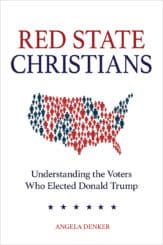
Several weeks ago, my son and I were talking about what seems, lately, to be one of his favorite words: hate. As a teenager expressing big emotions about matters I might find more trivial, my son employs the word hate with astounding regularity, telling me that he hates the chores I ask him to complete, or that a peer hates him, or that every kid in his school hates a curmudgeonly science teacher. Discussing the power of the word hate, I admitted there was only one person alive now for whom I truly felt hatred: Donald J. Trump.
Even confessing this fills me with shame, because I know that President Trump is loved by God. And I also recognize how my hatred for Trump compromises my relationships with people I know and love, and who voted for and continue to support Trump. Indeed, I feel even more anger—if not hatred—for my Christian kin who are Trump fans, because the president’s actions seem so detached from my own understanding of the gospels, and from Jesus’ ministry to the least of these.
I recognize how my hatred for Trump compromises my relationships with people I know and love, and who voted for and continue to support Trump.
For this reason, and for the health of my heart, mind, and soul, I am deeply grateful for Angela Denker’s excellent new book, Red State Christians: Understanding the Voters Who Elected Donald Trump. Denker spent more than a year traveling the country and interviewing Trump’s supporters, and the end result is a text that is at once compassionate toward Trump voters, while also holding red-state Christians accountable for embracing ideologies that seem to contradict the scriptural imperative to love one’s neighbors, practice mercy and kindness, and seek justice for those on the margins.
…the end result is a text that is at once compassionate toward Trump voters, while also holding red state Christians accountable for embracing ideologies that seem to contradict the scriptural imperative to love one’s neighbors, practice mercy and kindness, and seek justice for those on the margins.
Red State Christians is organized around issues that were central to Trump’s success as a Republican candidate for president, and that has remained at the center of his presidency. Denker includes chapters on those who are ardent defenders of the 2nd Amendment, and who see the right to bear arms as a Christian imperative; she analyzes Trump’s immigrant policies and xenophobia, and how those are driven by Christian nationalism; she addresses the economic hardships that led to support among rural voters. And, of course, Denker considers the role abortion debates played in the success of Trump among evangelical voters, and the belief many evangelicals share, that Trump is the most pro-life president the country has ever elected.
Denker’s book is so much more than a mere explanation of the reasons why Trump appealed to red-state Christians, especially as this is ground already covered by pundits, who too often relying on caricatures of evangelical voters. Instead, Denker’s reporting humanizes red-state voters, allowing readers to understand more fully why they voted for Trump and the often very personal reasons that guided their decisions and continue to inform their support for this president. Each chapter of Red State Christians allows Trump supporter voices to unfold, and Denker has included not only talking heads and those with significant platforms, but also evangelical pastors and laypeople; teachers and coaches; young Christians on fire for Trump, and older folks who see him as the strongest leader they’ve witnessed in their lifetimes.
While most of her interview subjects are white, Denker does include chapters on Latinx Christians at the Southern border, as well as the conservative Christians in El Paso who worship with Lantix people, and who diverge from other red-states Christians in their criticism of Trump’s anti-immigrant rhetoric. She also interviews Arab-American Christians in Houston, for whom an embrace of a prosperity gospel makes Trump an appealing leader. Denker’s considerable skills as a journalist are clear here: she asks important questions that welcome honest responses from Christians who have heard for the last few years that the anti-Christian media, who Denker represents, is the enemy of the people. Red State Christians synthesizes these different voices well, providing readers a very clear sense of why some Christians have continued to support a president who seems, to others, an antithesis of the gospel message.
While I still find these Christians’ reasons (personal or otherwise) for supporting Trump inexplicable, reading Red State Christians helps me see the ways that Trump voters, like everyone else, are shaped by their cultural and social contexts, their family and religious traditions, the narratives that have informed their upbringing. A Christian growing up in a small rural community, hearing the government is a threat to 2nd Amendment rights and that God and guns are inextricably linked, will most likely advocate for guns as a God-ordained necessity. She is informed by her environments, as much as I was informed by my childhood in the Mennonite church, where I learned that pacifism was central to Jesus’ gospels and that even those who affirmed a just war theory did not read about nor understand the biblical imperative for peacemaking.
…reading Red State Christians helps me see the ways that Trump voters, like everyone else, are shaped by their cultural and social contexts, their family and religious traditions, the narratives that have informed their upbringing.
At the same time, while humanizing Trump voters, Denker thoughtfully draws our attention to the contradictions and seeming hypocrisies that are part of some red-state Christians’ advocacy of Trump and his policies. In a chapter on evangelical women and Trump, for example, Denker wisely points to evangelicals’ puzzling embrace of a thrice-married president who has been credibly accused of assault, and whose promiscuity seems to contradict an evangelical sexual ethic. Denker notes that still, Trump is unlike other evangelical leaders in that he believes some women can offer spiritual wisdom: or at least one woman can, that being his informal spiritual advisor, Paula White.
Denker interviewed White for this book, and in Red State Christians reflected on the interview, and on the ways Trump reveals his misogyny: “He would not be your choice to speak about body positivity or empowering women. He objectifies women and critiques them physically. He is unfaithful in his marriages and an absent father. His political positions compromise women’s rights and destroy families in poverty. But unlike so many of his Evangelical pastor counterparts, Trump does appreciate a strong, smart woman. At least in that one way, he is more Christlike than many of them.”
In this indictment of Trump’s relationship with women, Denker is surely relying on her experience as a pastor, fighting within patriarchal church systems that limited women’s contributions as spiritual leaders. Red State Christians is well informed by Denker’s work within the Lutheran church, and at least one chapter—that on evangelical Christians in Orange County, California—directly references her life as a pastor in one of the nation’s most prestigious zip codes. Denker also has extensive experience as a journalist, and spent a decade in newsrooms on sports writing beats; she uses her extensive contacts, including within the sports community, to extend the reach of her reporting.
Denker’s considerable skills as a pastor and as a journalist are on full display in Red State Christians, which is accessible, well-written, and well-referenced, a necessary antidote not only to the countless polemics that decry evangelical support for Trump without providing evidence but also for fawning celebrations of Trump as the most Christian president ever. Instead, Denker’s in-depth reporting works to humanize those who are too often seen as caricatures in the media, while also holding Trump voters responsible for the chaos and destruction their support of the president has wrought.
In this way, Red State Christians challenges and sharpens my own worldview, and the book makes me reckon with my own heart as much as it does that of Trump voters. Because, while I might find some evangelical voters frustrating, while I might find my own heart tipping toward hate, Denker reminds me that others’ voices need to be heard. Red State Christians provides an important vehicle for Trump’s voters to explain their beliefs, while also reckoning with the destruction those beliefs have caused.
 Melanie Springer Mock is a Professor of English at George Fox University, Newberg, Oregon. She is also the author or co-author of five books including, most recently, Worthy: Finding Yourself in a World Expecting Someone Else (Herald Press, 2018). Her essays and reviews have appeared in The Nation, Christianity Today, The Chronicle of Higher Education, and Mennonite World Review, among other places.
Melanie Springer Mock is a Professor of English at George Fox University, Newberg, Oregon. She is also the author or co-author of five books including, most recently, Worthy: Finding Yourself in a World Expecting Someone Else (Herald Press, 2018). Her essays and reviews have appeared in The Nation, Christianity Today, The Chronicle of Higher Education, and Mennonite World Review, among other places.

